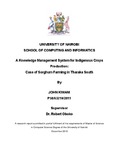| dc.description.abstract | Kenya continues to struggle with the challenge of an endemic food insecurity problem with over 50% of the population classified as food insecure (FAO, 2015). Recent research has shown that a food security strategy that’s dependent entirely on exotic crops which are greatly affected by sporadic rainfall is not sustainable. There needs to be conscious shift to indigenous crops which are more tolerant to unpredictable weather patterns. Sadly though, very little shareable knowledge exists on production of these crops; the production know-how is passed by word of mouth and demonstration across generations and sometimes lost in the process. This research seeks to show how this gap can be addressed using a knowledge management system. One of the key factors that distinguishes the intelligent production process of the 21st century is the emphasis on data, information and ultimately knowledge. Agriculture is no exception, the importance of knowledge management systems in agriculture can simply not be over emphasized.
This research started off with an exploratory pre-study to identify the key functionality that needed to be captured by the knowledge management system. The researcher used purposive stratified sampling to identify the key informants who would be approached for the exploratory study. These key informants were selected with a specific purpose being the information they would be able to provide towards development of the knowledge management system. The researcher chose to use participatory action research for the pre-study, which strengthened the research by emphasizing participation and action through collective inquiry based on social history and experience.
The pre-study brought to the fore the need for use of information technology in improving the sorghum production process. Three key themes emerged from the pre-study namely identification of best practices, convenient way of disseminating information to stakeholders and finally enhancement of research processes through use of information technology. These functional needs formed the basis for development of the knowledge management system. The prototype was developed using an evolutionary prototyping approach, where the prototype was continuously improved based on feedback from the key informants and test users. The prototype was evaluated using a usability testing approach, which focused more on the users’ interactivity with the application and general responsiveness, or lack thereof, to the features presented in the prototype.
The researcher recommends that further work be done to expand the solution to include more climate change crops to provide the small holder farmers with a wider crops option | en_US |



